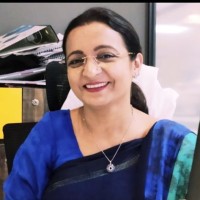
Dr. Saima Naz Khan, Ph.D
Breast Cancer Risk Assessment: Understanding the Role of Genetic Counselor.
Background: Breast cancer accounts for 14% of all cancers in women. The incidence rates in India begin to rise in women in their early thirties and the peak at ages 50-64 years. Overall, 1 in 28 women is likely to develop breast cancer during her lifetime (Ferlay J et al 2013). In urban areas, 1 in 22 women is likely to develop breast cancer during her lifetime as compared to rural areas where 1 in 60 women develops breast cancer in her lifetime (Bray F et al 2008).
In India, although the age-adjusted incidence rate of breast cancer is lower (25.8 per 100 000) than the United Kingdom (95 per 100 000) but mortality is at par (12.7 vs 17.1 per 100 000) with the United Kingdom (Gupta A et al 2015). The survey carried out by the Indian Council of Medical Research (ICMR) in the metropolitan cities from 1982 to 2005 has shown that the incidence of breast cancer has almost doubled (Ali et al 2011).
Indian women having breast cancer are found a decade younger in comparison to western women suggesting that breast cancer occurs at a younger premenopausal age in India. Breast Cancers in the young tend to be more aggressive. (Chopra B et al 2014; Sandhu D et al2010; Kakarala M et al 2010).
Genetics of Breast Cancer: The most common genes associated with hereditary breast cancer are BRAC1 and BRAC2, however, new genetic links are being discovered regularly. There are number of other genes like PALB2, CHEK2, CDH1 – CDH1, PTEN, STK11, TP53 that are known to influence breast cancer risk. PALB2 is currently the third most prevalent breast cancer gene.( Apostolou P et al 2013).
These associated genes apart from BRAC1 and BRAC2 which are closely contributory for Breast cancer (National Breast Cancer Foundation, INC.) are mainly included in many genetic testings for breast and ovarian cancer. Women with a BRCA1 or BRCA2 mutation also have an increased risk of developing ovarian, colon, and pancreatic cancers, as well as melanoma.
There still a set of other associated genes which play a vital role in the progression of breast cancer, such as ATM, BARD1, BRIP1, CASP8, CTLA4, CYP19A1, FGFR2, H19, LSP1, MAP3K1, MRE11A, NBN, RAD51, and TERT. They are thought to increase the risk of developing breast cancer when they carry a mutation. (Economopoulou P et al, 2015, Doreen M et al 2016).
Breast Cancer and Genetic Counseling: Although, it is impossible to change the genetic makeup of any individual or family history of breast cancer, knowing that you are at a higher risk can help with creating an early detection plan to detect breast cancer in its earliest stages, while it is still localized, and easier to treat.
Some people with a family history of breast cancer may choose to undergo genetic counseling and genetic testing to see if they have inherited genes. Individuals suffering from breast cancer can go for genetic counselling for further line of treatment, also women with a strong family history of breast cancer are encouraged to have genetic counseling. (Doreen M et al 2016).
It is important that individuals who are candidates for genetic testing undergo genetic education and counseling before testing to facilitate informed decision making and adaptation to the risk or condition. It allows them to consider the various medical uncertainties, diagnosis, or medical management based on different test results, the risks, benefits, and limitations of genetic testing which in term help them to cooperate with the disease and the treatment. (Riley BD et al 2013).
The genetic counsellor can help an individual and her family determine the best testing strategy. Even in specialized clinics, in more contemporary settings, identification of high-risk patients had been difficult. Individuals at risk for hereditary cancer can be identified at multiple different times. They may be identified after diagnosis and definitive treatment, or after diagnosis but before definitive treatment, and also when unaffected.
Each scenario presents its own set of challenges and different approaches to the patients with respect to counseling, testing, and risk management are required (Doreen M et al 2016). Once an accurate personal and family history has been obtained, the issue of genetic testing can be explored. Ideally, whenever possible, the first person tested in your family should be someone who has had breast, ovarian, or another BRCA-related cancer.
If none of one’s family members with a positive history of these cancers are available for genetic testing, then genetic testing can start with an unaffected person. However, the test results might not be as helpful. Likewise, there are multiple questions which need to be answered like, when should the test be ordered, who should order the test and how should results be communicated? Here comes the role of a genetic counselor who works parallelly with the clinician.
Therefore, genetic counseling provides a better and focused gateway for Primary health consultants (clinicians) to not only diagnose but also to further evaluate the risk factor, prognosis, and line of treatment.
Author
Dr. Saima Naz Khan, Ph.D
Ph.D – Molecular Biology, All India Institute of Medical Sciences, New Delhi.
Reference:
1. Economopoulou P, Dimitriadis G, Psyrri A. Beyond BRCA: new hereditary breast cancer susceptibility genes. Cancer Treat Rev. 2015 Jan;41(1):1-8. doi: 10.1016/j.ctrv.2014.10.008. Epub 2014 Nov 6. Review.
2. Apostolou P, Fostira F. Hereditary breast cancer: the era of new susceptibility genes. Biomed Res Int. 2013; 2013:747318. doi: 10.1155/2013/747318. Epub 2013 Mar 21.
3. Gupta A, Shridhar K, Dhillon PK. A review of breast cancer awareness among women in India: cancer literate or awareness deficit?Eur J Cancer 2015; 51: 2058– 66
4. Ali I, Wani WA, Saleem K. Cancer scenario in India with future perspectives. Cancer Therapy2011; 8: 56– 70.
5. Ferlay J, Soerjomataram I, Ervik M, et al. GLOBOCAN 2012 v1.0, Cancer Incidence and Mortality Worldwide: IARC CancerBase No. 11 [Internet]. Lyon, France: International Agency for Research on Cancer; 2013.
6. Bray F, Ren JS, Masuyer E, et al. Estimates of global cancer prevalence for 27 sites in the adult population in 2008.; 2013; Int J Cancer.; 132(5):1133-45.
7. Chopra B, Kaur V, Singh K, Verma M, Singh S, Singh A. Age shift: breast cancer is occurring in younger age groups—is it true?Clin Cancer Investig J 2014; 3: 526– 29
8. Sandhu D, Sandhu S, Karwasra R, Marwah S. Profile of breast cancer patients at a tertiary care hospital in north India. Indian J Cancer2010; 47: 16– 22.
9. Kakarala M, Rozek L, Cote M, Liyanage S, Brenner DE. Breast cancer histology and receptor status characterization in Asian Indian and Pakistani women in the U.S.: a SEER analysis. BMC Cancer2010; 10: 191.
10. Doreen M. Agnese and Raphael E. Pollock* Breast Cancer Genetic Counselling: A Surgeon’s Perspective. Front.Surg. 3:4, 2016.
11. Riley BD, Culver JO, Skrzynia C, et al.: Essential elements of genetic cancer risk assessment, counseling, and testing: updated recommendations of the National Society of Genetic Counselors. J Genet Couns 21 (2): 151-61, 2012.
Edited by:
Dr. Abira Ganguly
Scientific Editor at Bio-Services






